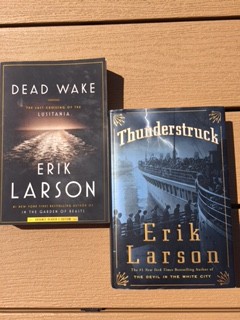May 06, 2016

I wanted to add my copy of Devil in the White City to this pic, but couldn't find it. That's how much I liked it - I must have loaned it to someone, yet I don't know who!
Devil in the White City, also by Mr. Larson, is one of my favorite books. And I’ve read and thoroughly enjoyed his novel Thunderstruck. Dead Wake was excellent as well, and I highly recommend all three books. This write-up is about the latter, however, so let’s get sailing.
Dead Wake connects the curious dots in a series of random, seemingly unrelated events that eventually led to the sinking of the infamous Lusitania ocean liner. Mr. Larson does a fabulous job intermingling three different plot lines to tell the full story. First and foremost we have life on the Lusitania itself--who’s there, what are they doing, how did they see things. Next, we have the menacing movements of the dangerous U-20 German submarine boat, which is skulking about the seas around Great Britain, intent on sinking any and all ships it sees. Finally, we have the activity of a top secret intelligence group in England known only as Room 40. An organization that was actively intercepting, interpreting, and deciding what to do about coded messages between Germany and its fleet, many of them about the U-20 sub and Lusitania. It seems that Room 40 could have, or should have, scrambled some destroyers to protect the Lusitania. Or radioed the grand ship to alter it’s course. Or simply warned them of the grave danger lurking under the waters into which they were sailing.
However, for one reason and the other, nothing was done. Take this, and add in a few other factors such as intermittent, unpredictable fog over the ocean, and one critical change in course for the mighty Lusitania, and you have one of the most heart-breaking, tragic sea-faring disasters in history. Surely this was second only to the downing of the Titanic.
And the big question that Mr. Larson seems to pose, which leaves us readers wide-mouthed and wondering is . . . did the powers that be in England shrug off the dangers facing the Lusitania thinking that, if something terrible should happen, it would draw America into WWI?
This book is a brilliant example of narrative, historical non-fiction, written by a true master of his craft. Everything is true in the novel, so we readers are constantly amazed as we learn about the Lusitania’s passengers, her captain, the Germans packed into their submarines, and the code-breakers watching the whole thing unfold over secret messages. I really appreciated how Mr. Larson put quote marks around all the specific facts and direct quotes used in the book, emphasizing that everything actually happened. The level of detail he has on the passengers, their belongings, their thoughts, their activities--it’s all remarkable.
To get all those facts and quotes, this author did an astounding amount of research. He travelled all over the world to read all he could on the topic, plus he visited many Lusitania related museums, and interviewed all sorts of experts. All this makes the book much more enjoyable because you know you are reading the reality of the situation, yet Mr. Larson lays Dead Wake out in such an accessible narrative story format, rather than like a textbook.
I will say that for me, The Devil in the White City was a little better as a story arc because you had one main character carrying most of the action. That one is about a serial killer who is ruthlessly taking lives around the time of the construction of the World’s Fair in Chicago in 1893. And it’s rumored to soon be a movie starring Mr. Leo Dicaprio. I’d urge you to read it as soon as you can get to it, because it is fabulous.
In Dead Wake, there are lots more characters to sift through so you don’t get quite the same clean, traditional story arc. But it’s still an excellent novel. If you or some other book-lover you know likes ships, WWI history, submarines, naval warfare, or anything of the like, this book is a must read. Truly, because it reads like a story, and is so expertly and cleverly pieced together, it could appeal to a wide range of readers. It’s best for adults, though, because it’s a complex, slow-moving book with lots of historical dates and people to keep straight in your mind as you read. The actual sinking of the ship is handled very gently by Mr. Larson as he lets us know what happened, and exposes us to some horrible things, but doesn’t shock us with any unnecessarily graphic violence.
As I said at the top, I highly recommend all of Mr. Larson’s books I’ve read: Dead Wake, Devil in the White City and Thunderstruck. Grab any of them and absorb some fascinating history that’s been written for you in an expertly-researched, narrative-story style that makes the truth a pleasure to learn.
Happy Reading!
Dead Wake connects the curious dots in a series of random, seemingly unrelated events that eventually led to the sinking of the infamous Lusitania ocean liner. Mr. Larson does a fabulous job intermingling three different plot lines to tell the full story. First and foremost we have life on the Lusitania itself--who’s there, what are they doing, how did they see things. Next, we have the menacing movements of the dangerous U-20 German submarine boat, which is skulking about the seas around Great Britain, intent on sinking any and all ships it sees. Finally, we have the activity of a top secret intelligence group in England known only as Room 40. An organization that was actively intercepting, interpreting, and deciding what to do about coded messages between Germany and its fleet, many of them about the U-20 sub and Lusitania. It seems that Room 40 could have, or should have, scrambled some destroyers to protect the Lusitania. Or radioed the grand ship to alter it’s course. Or simply warned them of the grave danger lurking under the waters into which they were sailing.
However, for one reason and the other, nothing was done. Take this, and add in a few other factors such as intermittent, unpredictable fog over the ocean, and one critical change in course for the mighty Lusitania, and you have one of the most heart-breaking, tragic sea-faring disasters in history. Surely this was second only to the downing of the Titanic.
And the big question that Mr. Larson seems to pose, which leaves us readers wide-mouthed and wondering is . . . did the powers that be in England shrug off the dangers facing the Lusitania thinking that, if something terrible should happen, it would draw America into WWI?
This book is a brilliant example of narrative, historical non-fiction, written by a true master of his craft. Everything is true in the novel, so we readers are constantly amazed as we learn about the Lusitania’s passengers, her captain, the Germans packed into their submarines, and the code-breakers watching the whole thing unfold over secret messages. I really appreciated how Mr. Larson put quote marks around all the specific facts and direct quotes used in the book, emphasizing that everything actually happened. The level of detail he has on the passengers, their belongings, their thoughts, their activities--it’s all remarkable.
To get all those facts and quotes, this author did an astounding amount of research. He travelled all over the world to read all he could on the topic, plus he visited many Lusitania related museums, and interviewed all sorts of experts. All this makes the book much more enjoyable because you know you are reading the reality of the situation, yet Mr. Larson lays Dead Wake out in such an accessible narrative story format, rather than like a textbook.
I will say that for me, The Devil in the White City was a little better as a story arc because you had one main character carrying most of the action. That one is about a serial killer who is ruthlessly taking lives around the time of the construction of the World’s Fair in Chicago in 1893. And it’s rumored to soon be a movie starring Mr. Leo Dicaprio. I’d urge you to read it as soon as you can get to it, because it is fabulous.
In Dead Wake, there are lots more characters to sift through so you don’t get quite the same clean, traditional story arc. But it’s still an excellent novel. If you or some other book-lover you know likes ships, WWI history, submarines, naval warfare, or anything of the like, this book is a must read. Truly, because it reads like a story, and is so expertly and cleverly pieced together, it could appeal to a wide range of readers. It’s best for adults, though, because it’s a complex, slow-moving book with lots of historical dates and people to keep straight in your mind as you read. The actual sinking of the ship is handled very gently by Mr. Larson as he lets us know what happened, and exposes us to some horrible things, but doesn’t shock us with any unnecessarily graphic violence.
As I said at the top, I highly recommend all of Mr. Larson’s books I’ve read: Dead Wake, Devil in the White City and Thunderstruck. Grab any of them and absorb some fascinating history that’s been written for you in an expertly-researched, narrative-story style that makes the truth a pleasure to learn.
Happy Reading!

